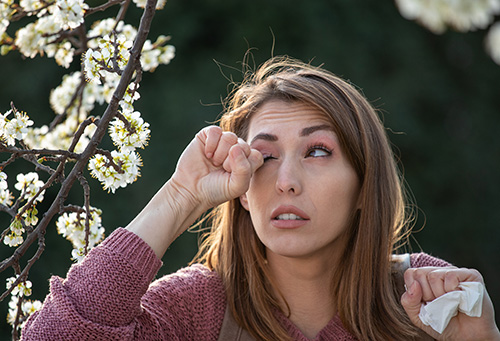2022-11-17 00:00:00Z

The impact of seasonal weather change commonly delivers (sometime severe) allergy-related eye diseases. Seasonal allergies are an allergic response causing itchy, watery eyes, sneezing and other similar symptoms. It is like other types of allergies that develop when the body’s immune system overreacts to something in the environment, especially during the season when certain plants pollinate.
Eye allergies are a reaction to indoor and outdoor allergens that get into your eyes. They are an easy target for allergens and irritants because they are exposed and sensitive. Examples of these are pollen, mold spores, dust mite and pet danger. They are not contagious. Normally, allergy sufferers will experience short-term vision blurriness and fortunately eye allergies will not cause long-term damage except if it is not a severe or potentially life-threatening allergic reaction. And the respiratory will have breathing through the mouth or wheezing. Whenever there are allergies, it suggests sneezing, a runny nose or watery eyes. While these are symptoms of some types of allergic disease, it is important to understand that the body responds to these allergens by releasing chemicals, including histamines, which produce the inflammation. Viruses and bacteria will also cause the same irritation of the eyes. Some medications and cosmetics will also cause eye allergy symptoms. The best option to prevent allergies is to avoid contact with things that trigger your eye allergies.
If you and your child are suffering from severe allergic eye discomfort, seek medical help. Do not wait to see if the symptoms go away. Eye allergy symptoms will disappear completely when the allergen is removed or after the allergy is treated. It is necessary to talk to your optometrist about what is best for you.
For more tips on Eye Care, contact VisualEyes Optometrists.
(703) 417-9316
(703) 671-1188
(703) 764-3937
(703) 804-0355
(Pentagon ID Holders Only)
5876 Kingstowne Center Alexandria, VA 22315
Visit Website Make Appointment4018 Campbell Avenue Arlington, VA 22206
Visit Website Make Appointment9600 H. Main Street Fairfax, VA 22031
Visit Website Make Appointment1 South Rotary Road, STE 2C113
Arlington VA 22202
(For Authorized Pentagon Personnel Only)
Copyright 2025 VisualEyes Optometry. All rights reserved. Website Designed and Maintained by WSI Pro Marketing.
